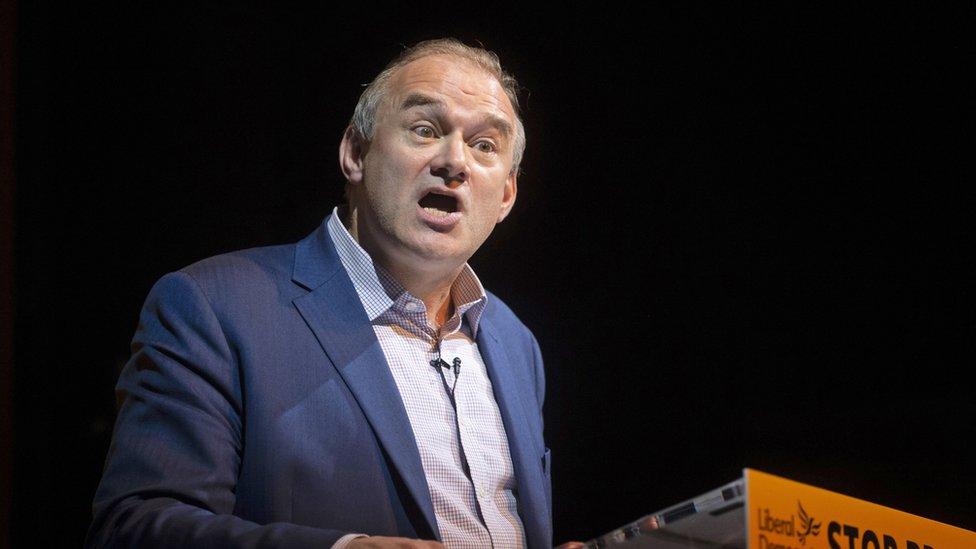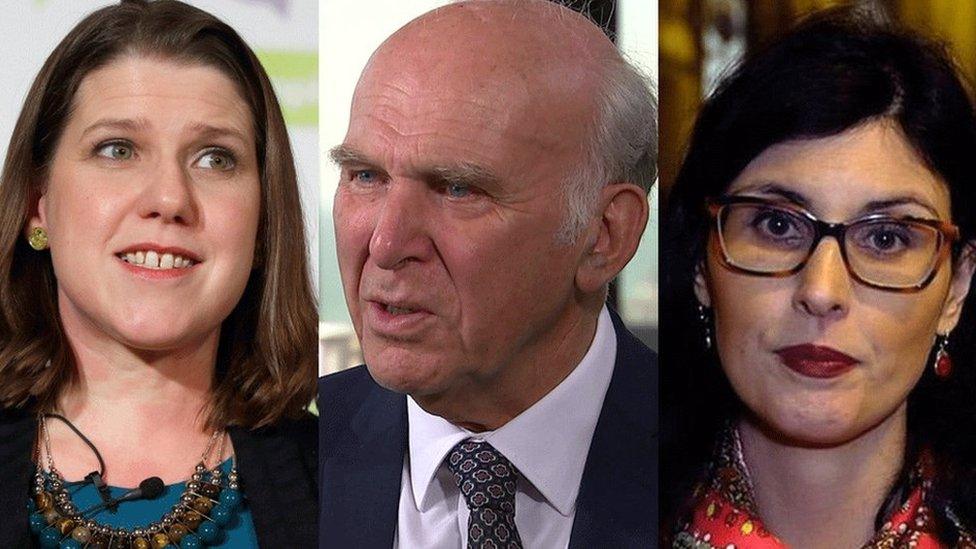Jo Swinson confirms Liberal Democrat leadership bid
- Published
The party's deputy leader Jo Swinson said: "I am the person to lead it"
Jo Swinson has announced she will run to become the next leader of the Liberal Democrats.
The party's deputy leader told the BBC the country was "crying out" for a movement "to challenge the forces of nationalism and populism".
She faces competition from former Energy Secretary Sir Ed Davey, who has declared his intention to stand.
Current leader Sir Vince Cable will step down on 23 July and nominations to replace him close on 7 June.
The pro-EU Lib Dems came second in the UK's European elections last week, taking 20.3% of the vote.
Ms Swinson, MP for East Dunbartonshire and a former equalities minister, was thought likely to stand when former leader Tim Farron quit in 2017 but ruled herself out and went for the deputy position instead.
Asked if she would be running this time, she told BBC Question Time: "Yes, I am going to stand to be leader of the Liberal Democrats.
"I will set out my plans but I happen to think that this country is crying out for a liberal movement that will challenge the forces of nationalism and populism and the Liberal Democrats need to be at the heart of that movement and I'm the person to lead it."
'Some mistakes'
Speaking to BBC Radio 5 Live, she said she could not currently envisage taking the party into coalition with either of the main parties, adding that the Conservatives and Labour were "both led by Brexiteers".
"We're a party that wants to remain in the European Union because of the huge benefits that gives us", she added.
Ms Swinson admitted that the Lib Dems had made "some mistakes" when they entered coalition with the Conservatives in 2010, but said the decision to enter government had been "the right choice" at the time.
The Lib Dems say 6,000 new members have joined the party since polls closed in last week's European Parliamentary elections, making it 11,000 new members this month. The party says its membership now stands at more than 100,000.
2017Elected as Lib Dem deputy leader
2015Lost seat in election after 5 years of coalition government
2005Elected MP at age 28 after working at Viking FM in Hull
2018First MP to take her baby into a Commons debate
Meanwhile, a poll of 1,763 adults by YouGov for the Times, on which party they would back if a general election was held now, was topped by the Lib Dems on 24%, ahead of the Brexit Party on 22%.
The Conservatives and Labour were tied on 19% and the Greens on 8%. The poll, conducted on 28 and 29 May, also found that nearly 70% of voters believed Brexit was the most important issue facing the UK.
But Brexit Party leader Nigel Farage criticised the poll because his party was grouped under "others", alongside the SNP, Plaid Cymru, UKIP, Greens and Change UK in the first question, rather than appearing more prominently:
He tweeted:
Allow X content?
This article contains content provided by X. We ask for your permission before anything is loaded, as they may be using cookies and other technologies. You may want to read X’s cookie policy, external and privacy policy, external before accepting. To view this content choose ‘accept and continue’.
YouGov's director of political and social research, Anthony Wells, said its main consideration, external when asking questions was "what is most likely to produce the most accurate results, not what would help one party or another".
Candidates for the Lib Dem leadership must be an MP supported by at least 200 members spread across at least 20 different local parties.
They must also have the backing of 10% of the parliamentary party - currently, the party has 11 MPs.
Lib Dem members will then have the final say on who becomes leader.
- Published30 May 2019

- Published16 March 2019
